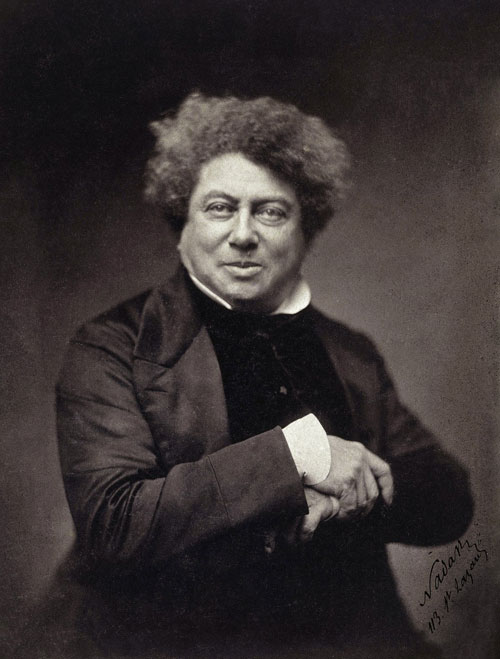
Alexandre Dumas
Alexandre Dumas (24 July 1802 – 5 December 1870), also known as Alexandre Dumas père, was a French novelist and playwright.
Biography.
His works have been translated into many languages and he is one of the most widely read French authors. Many of his historical novels of adventure were originally published as serials, including The Count of Monte Cristo, The Three Musketeers, Twenty Years After and The Vicomte of Bragelonne: Ten Years Later. Since the early 20th century, his novels have been adapted into nearly 200 films. Prolific in several genres, Dumas began his career by writing plays, which were successfully produced from the first. He wrote numerous magazine articles and travel books; his published works totalled 100,000 pages. In the 1840s, Dumas founded the Théâtre Historique in Paris.
His father, General Thomas-Alexandre Dumas Davy de la Pailleterie, was born in the French colony of Saint-Domingue (present-day Haiti) to Alexandre Antoine Davy de la Pailleterie, a French nobleman, and Marie-Cessette Dumas, an African slave. At age 14, Thomas-Alexandre was taken by his father to France, where he was educated in a military academy and entered the military for what became an illustrious career.
Alexandre acquired work with Louis-Philippe, Duke of Orléans, then as a writer, a career that led to early success. Decades later, after the election of Louis-Napoléon Bonaparte in 1851, Dumas fell from favour and left France for Belgium, where he stayed for several years. He moved to Russia for a few years and then to Italy. In 1861, he founded and published the newspaper L’Indépendent, which supported Italian unification. He returned to Paris in 1864.
English playwright Watts Phillips, who knew Dumas in his later life, described him as “the most generous, large-hearted being in the world. He also was the most delightfully amusing and egotistical creature on the face of the earth. His tongue was like a windmill – once set in motion, you never knew when he would stop, especially if the theme was himself.”
Birth and family
Dumas Davy de la Pailleterie (later known as Alexandre Dumas) was born in 1802 in Villers-Cotterêts in the department of Aisne, in Picardy, France. He had two older sisters, Marie-Alexandrine (born 1794) and Louise-Alexandrine (1796–1797). Their parents were Marie-Louise Élisabeth Labouret, the daughter of an innkeeper, and Thomas-Alexandre Dumas.
Thomas-Alexandre had been born in the French colony of Saint-Domingue (now Haiti), the mixed-race, natural son of the marquis Alexandre Antoine Davy de la Pailleterie (Antoine), a French nobleman and général commissaire in the artillery of the colony, and Marie-Cessette Dumas, an enslaved woman of Afro-Caribbean ancestry. The two extant primary documents that state a racial identity for Marie-Cessette Dumas refer to her as a “négresse” (a black woman) as opposed to a “mulâtresse” (a woman of visible mixed race). It is unknown whether Marie-Cessette was born in Saint-Domingue or in Africa, nor is it known from which African people her ancestors came. What is known is that, sometime after becoming estranged from his brothers, Antoine purchased Marie-Cessette and her daughter from a previous relationship for “an exorbitant amount” and made Marie-Cessette his concubine. Thomas-Alexandre was the only son born to them, but they had two or three daughters.
In 1775, following the death of both his brothers, Antoine left Saint-Domingue for France in order to claim the family estates and the title of Marquis. Shortly before his departure, he sold Marie-Cessette and their two daughters (Adolphe and Jeanette), as well as Marie-Cessette’s oldest daughter Marie-Rose (whose father was a different man) to a baron who had recently come from Nantes to settle in Saint Domingue. Antoine however retained ownership of Thomas-Alexandre (his only natural son) and took the boy with him to France. There, Thomas-Alexandre received his freedom and a sparse education at a military school, adequate to enable him to join the French army, there being no question of the mixed-race boy being accepted as his father’s heir. Thomas-Alexandre did well in the Army and was promoted to general by the age of 31, the first soldier of Afro-Antilles origin to reach that rank in the French army.
The family surname (“de la Pailleterie”) was never bestowed upon Thomas-Alexandre, who therefore used “Dumas” as his surname. This is often assumed to have been his mother’s surname, but in fact, the surname “Dumas” occurs only once in connection with Marie-Cessette, and that happens in Europe, when Thomas-Alexandre states, while applying for a marriage license, that his mother’s name was “Marie-Cessette Dumas”. Some scholars have suggested that Thomas-Alexandre devised the surname “Dumas” for himself when he felt the need for one, and that he attributed it to his mother when convenient. “Dumas” means “of the farm” (du mas), perhaps signifying only that Marie-Cessette belonged to the farm property.





